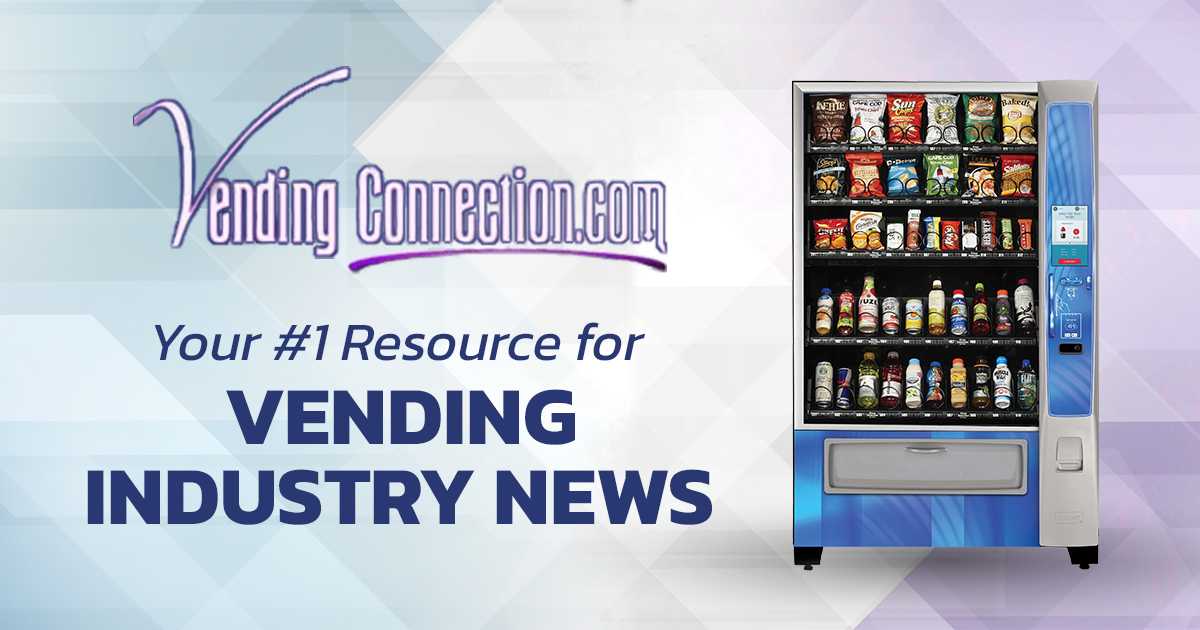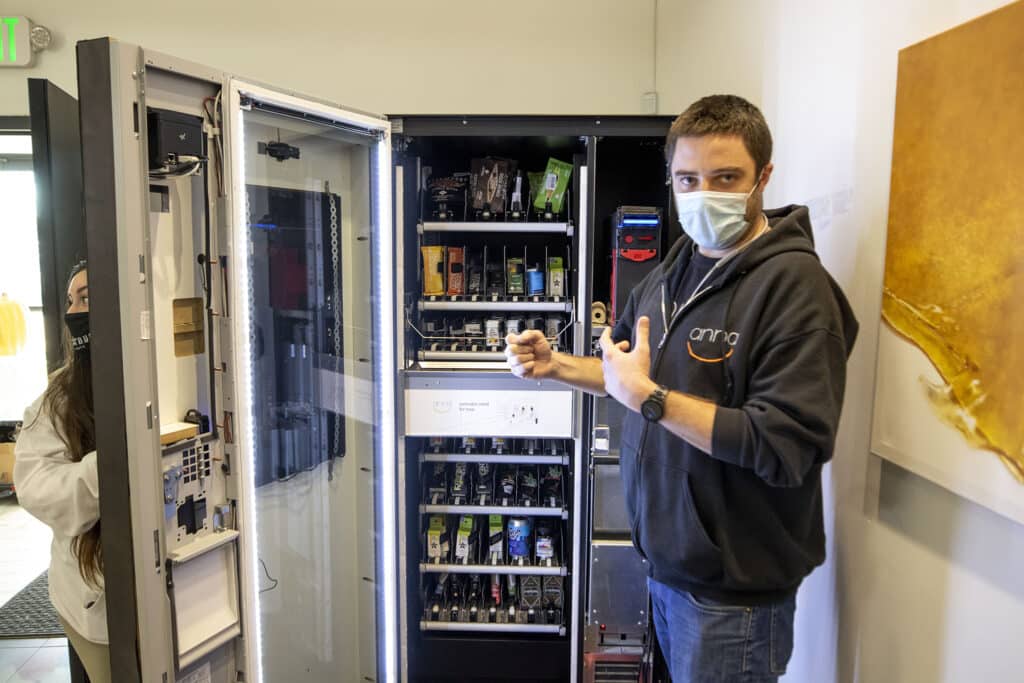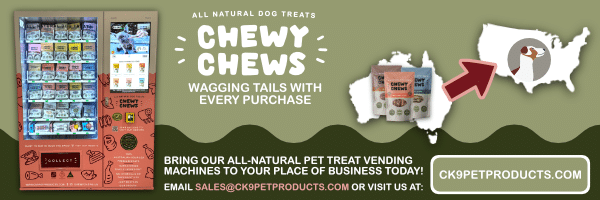Benefits of Starting a Vending Machine Business
Vending machines are highly flexible and convenient for new business entrepreneurs. Offering a range of options for what you sell and where you sell it. Maintenance costs and upkeep are minimum, and a single vending machine can bring in hundreds of dollars each month, when on a high traffic or high employee location.
The following are some of the main benefits of starting a vending machine business, read on.
Low start-up costs
The only initial cost is the price of your machine and the stock to fill it, plus monthly rental or commissions to the person who owns your vending machine location. You can run your business by phone or online and don’t need a physical office space unless you want to invest in a large-scale business. Work from home or anywhere.
Ability to earn passive income
While servicing your vending machines and making business deals with vendors may take time and effort, vending machines can earn passive income. or great full-time income. After you install your vending machines, they advertise themselves, sell your inventory and collect payments on your behalf. You can monitor them via the machine’s built-in software programs.
Scalability
If you become profitable in one location, you can expand your business by purchasing more machines applying your business plan to other locations.
Check out: The Vending Start-Up Ekit
How much does it cost to start a vending machine company?
You can start a vending machine company with less than $5000.
The main startup costs of a vending machine company are:
- Vending machines (buy used or new).
- Licenses (obtained from the city hall in the city which the vending machine is placed).
- Insurance (contact your insurance broker for equipment and liability insurance).
- Leasing (if you choose to lease the machines in lieu of buying them).
- Inventory (Products to fill the vending machines may be bought from Sam’s Club or Costco, or direct from the distributor or manufacturer).
- Transportation (Route servicing time, gas, maintenance on vehicles).
The actual startup costs of your vending machine company depend on your short-term and long-term business goals. If you want to install several new high-tech custom vending machines throughout an area, your costs will be significantly higher than if you set up a single pre-owned vending machine. Buying more expensive inventory will also impact your initial investment, with candy machines being more affordable to stock than electronics vending machines.
Researching your area
Before you buy your first machine, perform basic market research in your service area to help you decide what kind of vending machine to purchase, what kind of inventory you can sell and what locations are available to place a vending machine. You’ll want to find an area where there isn’t already a range of options to get the most cash flow possible and avoid competition. Research can involve analyzing keywords on search engines, driving around to different locations or calling property owners and inquiring about business opportunities.
Selecting your equipment for specific locations
Snack and drink machines usually come to mind when people think of vending machines, but you can build a lucrative business using a wide range of vending equipment. Consider these main types of vending machines:
Food and Drinks
Most of the vending machines in the U.S. sell soda, water, snacks, energy drinks and candy. Food and beverage machines have higher operating costs than bulk vending machines, but they also tend to have much higher demand from customers. If you want to get started with a food and beverage machine, research what specific products appeal to your target customers and earn enough profit to cover operating costs. Here’s the basic information about these machines:
- Average price range: $1000 Used to $5000 Brand new.
- Popular inventory choices: Candy bars, chips, protein bars, energy drinks, water, cookies, healthy snacks, sandwiches.
- Main benefits: Potential for high traffic and product turnover, resulting in more profits. Business locations with over 50 employees.
- Extra Costs: Ongoing maintenance and the cost of electricity, product loss and refunds.
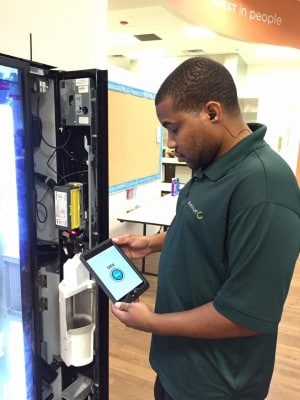
In addition to standard snack and bottled drink machines, you can also buy specialty food and drink vending machines. These are usually a bit more expensive due to their specialized nature, but prices vary depending on the specific type of machine. Specialty food and drink vending machines are popular in workplaces, where employees might prefer the convenience of a vending machine to packing their own lunch or going out to eat.
Examples of specialty food and beverage vending machines are:
- Coffee vending machines
- Deli vending machines
- Ice cream machines
KEEP IN-THE-KNOW by signing up to receive Vending Newsletters from Vending Connection.
Specialty vending
To appeal to a specific audience, consider investing in a specialty vending machine where people can buy makeup, cell phone chargers and even over-the-counter medication. Specialty vending machines are usually more secure, with advanced technology to handle payments and refunds if there is a vending error. With specialty vending machines, each slot is usually customized to fit a certain product, so they can be more expensive to buy outright than other types of vending machines and are unlikely to have refurbished options. Here’s a general breakdown about this type of machine:
- Average price range: $3,000- $10,000 Brand new.
- Popular inventory choices: Electronics, beauty products, laundry products, office supplies, CBD Hemp products and more.
- Main benefits: Higher sales prices, streamlined user interface.
Once you decide on a category, shop around with different suppliers to get quotes on various machines. Think about whether you need credit card services, refrigeration, custom branding, interactive screens or other modifications that could make your machine more appealing to customers.
When buying new, you should also ask the manufacturer about the warranty on your machines. Check the price of spare parts so you know how much you might spend on common repairs. If you purchase a refurbished bulk vending machine, keep in mind that it may be difficult to find replacement parts if the machine is no longer in production. Research the model number of whatever machine you choose and make sure you understand how to do basic repairs and maintenance.
Getting funding
You may be able to fund your small business out-of-pocket, but you can also seek outside funding through a loan or equipment financing. Determine how much money you will need to purchase your initial equipment and inventory and decide if you are willing to take on debt to fund the startup costs. If you apply for a loan, you may need a business plan and a budget prepared to explain how you plan to use the money.
Check out Financing Companies.
How to make a budget
When you’ve pinpointed the equipment you want to purchase, make a budget and set the initial prices for your inventory. Having a budget can help you understand where to set your prices to be the most profitable and guide your financial decisions as your business grows. Follow these steps to create a functional budget for your vending machine business:
1. Determine operating costs
Make a list of all of your one-time and recurring expenses. Many business owners have a short-term budget, like a weekly or monthly budget, in addition to a yearly spending plan. Gather information on the costs of your business, such as:
- Cost of inventory
- Rent
- Regular maintenance
- Gas and transportation
- Loan repayment
- Equipment lease
- Sales tax
- Fees paid to locations
If you plan to take a salary, factor in the amount you would like to get paid with your operating costs.
2. Calculate your required profit
Once you know about how much you’ll spend, you can calculate how much money you need to make to cover all of your business expenses. For example, if you spend $100 per month on inventory, rent and gas, you would need to make at least $100 in sales to break even. Any additional sales would be profit. Knowing this number can help you set your prices at the most profitable number.
3. Test different price points
Look at the prices of other vending machines and decide on the right price point for you. If you sell specialty items, you might charge a higher price to maximize your profit, but standard snacks like candy and chips might need a lower price point to attract customers and make sales.
Once you start making sales, you can use different price points to project future income that could go back into your budget for things like marketing, equipment upgrades or a personal salary.
Registering the business
Many local governments have regulations requiring vending machine operators to get a license for their business. Even if it is not required by law in your area, registering your business as a legal entity like an LLC and applying for a license may help give you legal protection if someone sues your vending machine business.
To create an LLC, decide on a name and file articles of organization with your state’s filing office. To help keep your new LLC separate from your personal assets, keep track of your business expenses in a dedicated business account. Compare the monthly fees, interest rates and credit card offerings as different banks and credit unions before opening an account. Next, register for state and federal taxes by applying for an Employer Identification Number (EIN). You can do this in person, by mail or online on the IRS website. Your EIN is a nine-digit number that helps identify your business when you file your taxes.
Scouting locations for your machines
Location is extremely important for vending machine business owners because the amount of foot traffic that passes by your vending machine will have a direct impact on sales. Look for busy locations that attract your target customer. Locations that have high foot traffic or require people to wait around are both ideal for vending machines and can include:
- Auto dealerships
- Laundromats
- Auto Repair shops
- Doctor or vet offices/clinics
- Specialty Gyms
- Recreational centers
- Senior Centers
- Vocational Schools
- Universities/Colleges
- Hotel/Motels
- Cooperate Offices
- Industrial buildings
- Manufacturing
- Transportation Warehouses
Obtaining a Custom Location List, custom for your area of service.
Do your research on how many people pass through your desired location each week and determine how many customers you need to make a purchase each week to remain profitable. Make a list of potential locations and find the contact information for the property manager or owner.
Hiring a specialty Location Locator (They charge on a location fee basis).
Ultimately, convincing a property manager to allow you to place a vending machine on their property is a sales process. To start a strong business relationship with potential leads, follow these steps:
- Introduce yourself. Email or call all of your leads and let them know who you are and how you can contribute to their business.
- Explain what you have to offer. Share your business plan with the property owner and explain how you can bring value to their space. For example, offering snacks or drinks to customers at a mall could encourage them to stay and shop longer. If the owner sees your vending machine business as mutually beneficial, they may be more likely to make a deal.
- Negotiate rent. Some locations may charge a flat monthly rate, while others may want a small percentage of your monthly sales.
- Maintain the relationship. Even after you have convinced a property owner to let you set up your vending machine, check in regularly with them to continue growing your business. Build a personal relationship with the business owner and ask them for feedback on the products you offer to help them feel invested in you and your company.
- Keep looking. Once you secure the perfect location, don’t stop your search. Keeping a current list of qualified leads can help you quickly grow your business if you ever want to expand or find a new location if your machine stops making money.
Installing and stocking your machines
Load up your vending machine in your truck or hire a mover to install it at your new location. Keep your machine fully stocked with your selected inventory and consider changing or rotating products to see what sells best with your target audience.
For example, if you have a vending machine at a gym, try stocking new types of healthy snacks and energy bars, recording how inventory influences sales and making note of your best-sellers. When you go to re-stock, count how many units sold of each product. This can help you predict the amount of inventory you’ll sell and order the right amount of each product ahead of time.
Performing maintenance on your machines
You’ll be leaving your machines unattended for long stretches of time, so it’s important to create a schedule where you can service your machines and make sure they are clean, functional and well-stocked with product customers want. Customers expect vending machines to be clean and organized, especially if they are purchasing food. Create a cleaning schedule to wipe down your machines, remove graffiti, clean up spills and make sure all the buttons, card readers and lights are functional.
Investing back in the business
You can invest back into your business by buying more vending machines, upgrading the user interface with a touchscreen or new software, purchasing an inventory management system, buying security cameras to check up on your machine or even hiring an employee for customer support, location scouting and stocking.
If you decide to hire staff, consider administering background checks and drug tests for each new employee. Some locations may require that all of your employees meet certain standards before they agree to give you access to their property.
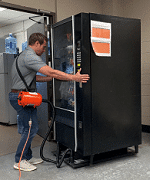
Frequently asked questions about vending machine businesses
How much is a vending machine?
New snack vending machines usually start at $3,000 but can cost less or more depending on the type of vending machine it is. Used machines will usually cost less than new ones, and some custom vending machines can cost up to $20,000.
How much money do vending machines make?
The amount of money a vending machine makes depends on what products it sells, where it’s located and how well it’s maintained. Most vending machines make an average of $100 per week net profit. Vending machine business owners can change the placement of their machine or buy multiple machines to increase their stream of profit.
Where can I install a vending machine?
You can install a vending machine almost anywhere as long as you have permission from the property owner. Vending machines that require electricity will need to be placed in a location that has easy access to power outlets.
For more information visit VendingConnection.com and sign up for our specialty vending newsletters for continued knowledge in growing your own vending business.
Also see: The Vending Start-Up Ekit | Vending Suppliers Directory | VENDLOCO LISTS
Call us direct at 800-956-8363 or email karen@vendingconnection.com
